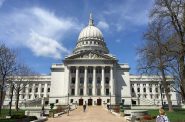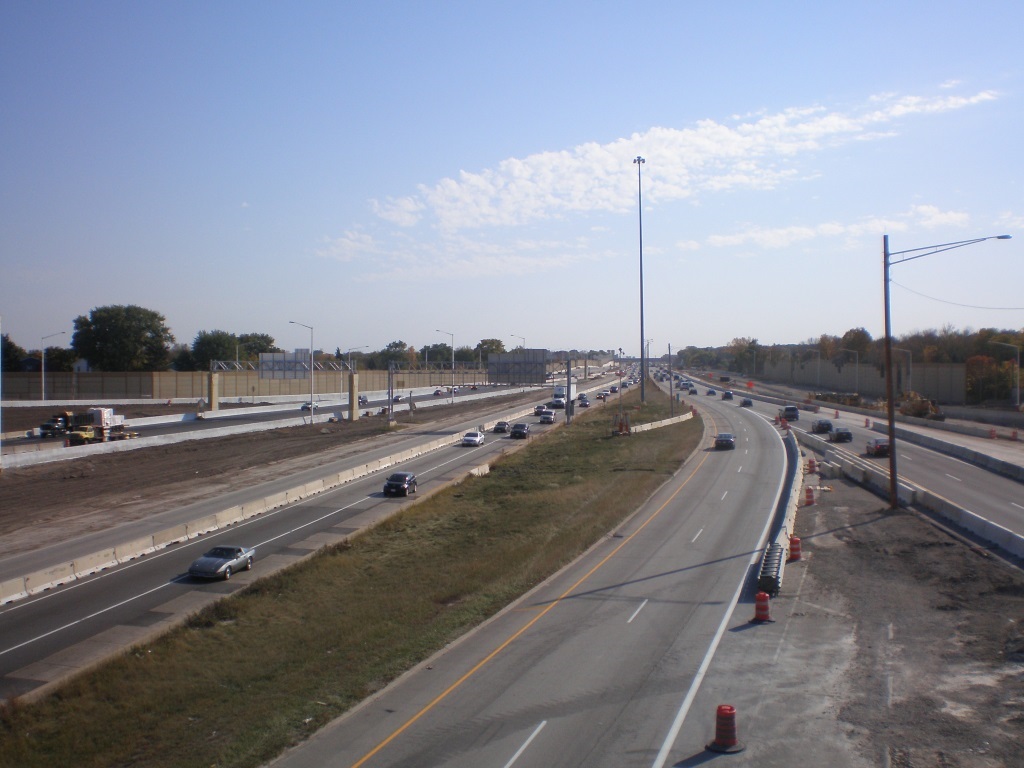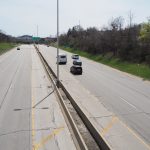Gas Tax Insanity
Bipartisan opposition to the gas tax is causing potholes and rising car repair bills, and hurting the state economy.
If I had a dollar for every time I heard a politician talk about “kicking the can down the road,” I’d probably be a wealthy man. The mind-numbing frequency with which this phrase is used, though, tells us something about the current political climate, where any policy making that looks long term, even a couple years down the road, can be hard to find.
A case in point is the state gas tax, which is really just a user fee that drivers pay to finance the building and maintenance of roads. There seems to be a national bipartisan reluctance not just to raise gas taxes, but to simply maintain them at the same level in real dollars. As a 2010 report by the Institute on Taxation and Economic Policy (ITEP) noted, “total state gas tax revenues nationwide… were lower as a share of personal income than at any point since the widespread adoption of state gas taxes at the end of the 1920’s. In layman’s terms, this means that state gas taxes are a less significant component of families’ household budgets than they have been in roughly eighty years.”
And the situation has only gotten worse in the last five years. Witness the squirming of Republican legislative leaders, who are unhappy that Gov. Scott Walker’s budget will greatly increasing the amount of borrowing for the state transportation fund, yet won’t hear of increasing the gas tax an iota, even though its value has been declining for some 20 years in Wisconsin. “If nothing is done, state transportation funding could be short between $2 billion and $6 billion over the next 10 years,” a 2014 study by the Wisconsin Taxpayers Alliance warns.
The result is a catalogue of ills for this state, including runaway borrowing, poor maintenance of roads across the state, an epidemic of pot holes, and increasing costs for car repairs for motorists who could instead be paying a few cents more per gallon in a fuel tax. The annual dance around the fuel tax has become a continuing, bipartisan comedy in Wisconsin. “Neither Democrats nor Republicans for the past 15 years have been willing to make a decision,” says Todd Berry, President of the Taxpayer Alliance. Under both Democratic Gov. Jim Doyle and Republican Walker, “we’ve punted and borrowed,” he adds.
Last year Walker gave his transportation secretary Mark Gottlieb, a civil engineer and former legislator, the task of developing “a thoughtful plan” to generate revenue for transportation. In November, Gottlieb announced his proposal, which used a complicated formula that in essence, would have raised the gas tax by about 5 cents per gallon, or $2.25 per month per average driver, and also hiked the vehicle registration fee by $50 a year for drivers of hybrid and electric vehicles, who pay little or nothing at the pump.
This small increase in the gas tax wouldn’t have even raised its level in real dollars back to what it was in the year 2000, much less the 1990s or ‘80s. Yet it would have raised $750 million a year. Craig Thompson, executive director of the Wisconsin Transportation Development Association, called it “a really thoughtful, comprehensive proposal that doesn’t kick the can down the road.”
Thompson apparently didn’t realize Walker’s goal was exactly that, to boot the can down the highway. Thompson told the Journal Sentinel he believed the governor was involved in developing this thoughtful proposal. Wrong. Walker often likes to have his department heads propose some kind of funding increase that he can then overrule and pose for a fiscal conservative holy card. Walker had warned Gottlieb he wanted no tax increase, which made the whole thing an exercise in futility.
Nor were GOP legislative leaders interested in Gottlieb’s vision for the future. Republican Senate Majority Leader Scott Fitzgerald has made it clear he opposes an increase in the gas tax. More than 40 of the 63 Assembly Republicans are willing to consider a gas tax increase, Urban Milwaukee columnist Steven Walters has reported, but Fitzgerald and Republican Assembly Speaker Robin Vos presumably fear that some Democrat might run on this issue in one of the few legislative seats that hasn’t been redistricted into an unassailable fiefdom for incumbents.
It’s hardly surprising so many Assembly Republicans favor an increase in the gas tax, given the plague of potholes across the state. Wisconsin has 11,800 miles of state and Interstate highways, but 103,000 miles of county highways and municipal roads and streets to maintain and state funding for the Local Roads Improvement Program has been cut by 45 percent between 2000 and 2013.
Local officials have been complaining for years that they no longer can afford to repair all the potholes. An analysis of the state by 1000 Friends of Wisconsin found that conditions vary by section, but 32 percent to 45 percent of roads in the state are in bad condition. And poor road conditions cost drivers $502 per year on average in extra vehicle repairs and operating costs, according to a report by national transportation research group TRIP. Nationally, AAA has estimated, pot holes cost drivers $6.4 billion a year for auto repairs.
As the report by WisTax noted, all companies rely on transportation to some degree, if only for employees commuting to work. “However, four industries stand out as most reliant on it: manufacturing, farming, transportation (trucking, in particular), and tourism.” And in Wisconsin, manufacturing, farming, and trucking claim a larger share of employment and wages than in any other state, save Indiana, the report noted.
In short, there may be no better way to stifle Wisconsin’s economy than to let its roads deteriorate. And because Wisconsin also is a big state for tourism, with countless Illinois residents driving up north to cabins and cottages they own or rent, they are underpaying for all the wear and tear on roads and highways they cause. Indeed, you could argue that the gas tax is one of the least onerous taxes because so much of it falls on visitors to the state. In Iowa, it’s been estimated that out-of-state residents pay 20 percent of the tax; in New Jersey the estimate is 27 percent. “It wouldn’t surprise me if it’s 25 percent in Wisconsin,” Berry says.
We Wisconsinites get gouged by the toll roads in Illinois. Yet we won’t even charge Flatlanders a reasonable gas tax. Republican leaders are now gathering the votes to raise the state’s annual auto registration fee to $100, up from $75. That will raise an additional $116.7 million per year, which will hardly make a dent in the problem, and will tax only state residents. Small wonder Illinois residents so love vacationing here.
Murphy's Law
-
Is Legislature Biased Against Working Class?
 Apr 4th, 2024 by Bruce Murphy
Apr 4th, 2024 by Bruce Murphy
-
Associated Press Will Decline in Wisconsin
 Mar 27th, 2024 by Bruce Murphy
Mar 27th, 2024 by Bruce Murphy
-
City Attorney Race Is Vitally Important
 Mar 25th, 2024 by Bruce Murphy
Mar 25th, 2024 by Bruce Murphy


















I’m still wondering why gasoline is exempt from the normal state sales taxes. That’s just another giveaway to the roadbuilders while we talk about a huge hole in the state budget leading to cuts to education at all levels.
Since I live and work in the city I would prefer a higher gas tax. Raising the registration fees is just another way urban dwellers subsidize the burbs.
Thanks, David. Until your post, I never saw an explanation for why anybody would prefer raising registration fees to raising the gas tax, which is the fairer option because those who drive more pay more. And, as Bruce points out, out-of-staters using our roads pay gas tax.
To be fair we must tax the little cars twice as much cause they use the road but do not pay their fair share. If your get twice the average mileage than you have to pay twice the gas tax. Jimmy carter said that life must be fair.
Gov. Rick Snyder (R) of Michigan ran an extensive effort to INCREASE (yes, Republican) gasoline taxes in Michigan. Unfortunately, the effort became a grab bag of tax increases including a one percentage point (17%) increase in the state sales tax. The measure was overwhelmingly defeated (80% against) in a May 5 special election. It was hated by both Republicans and Democrats… include Independents while you are at it.
People, including Republicans, are not necessarily against taxes or even increasing taxes when the taxes are specifically directed AND after a thorough analysis of existing spending has shown that it is efficient (no wasted expenses and effective in solving whatever the problem is). This is generally not the way tax increase proposals are written. People look at the hundreds of millions of dollars spent on road maintenance, repair, and rebuilding and ask, “Why do those damn things fall apart so fast?” What they are questioning is “why are tax dollars wasted on processes that do not effectively fix the roads?”
The incentives are perverse. Use substandard materials and methods and get paid for the road work. When the road work fails quickly, use substandard materials and methods and get paid again. Repeat often. Change the incentives and the process and products will align differently. Then ask about getting a tax raise.
I thought the GOP just calls it a fee when it’s convenient to do so? Did anyone else read the amusing story in the NY Times about Republicans in Alabama allowing a tribe to pay off the entire state debt in exchange for gaming rights despite widespread disapproval of gambling in the state? All because the only other alternative is a tax increase. Grover Norquist is a moron.
WCD hybrid and electic cars would pay a higher registration fee which would offset the shortage that would occur from them paying less fuel tax. Also those types of cars are lighter thus less average wear and tear on the roads.
I think based on this article the Gottlieb proposal is pretty close to being fair. Too bad Dems and Republicans don’t have the grit to do what is right.
If we exempted the oligarchs from any obligation to pay their taxes and just relied upon the 99% to pay their taxes then would the !%
go away and stop destroying our country?
Earlier this spring Iowa Governor Terry Branstad said he would support a ten cent gas tax if the legislator passed it and offered a list of projects in need of immediate attention. The legislature passed it and the governor signed it in less than a week. The DOT said the legislature’s priority one couldn’t be done immediately but number two would get underway this construction season. Supporters of priority one said, OK, priority two is in really bad shape, too. This is how adults do it.
Increase the gas tax, and tie registration fees to the weight of the vehicle. I agree Casey, a Mini Cooper doesn’t do nearly the damage of six ton Canyonero.
You have to give Gottlieb credit, he worked hard to find a workable long-term solution. Yeah, you could quibble over some of the details, but he had a reasonable plan. As you’d expect from an engineer.
I just don’t get the knee jerk response to the word “tax”. Wisconsin has a heavy investment in road infrastructure and you have to pay not only to build it but to maintain it. Inflation is a real thing. The only way to fill that revenue gap is for residents and users to pay for it. If raising a tax is a bad thing, it doesn’t mean raising a fee is a good thing. Either way, residents of the state pay for it.
And, arguably, it would be fairer if out of staters paid for the roads that they use as well. I’m sure the tourist lobby also was against it, but a mix of registration fees, I fully agree that hybrids/electrics should have a higher registration fee, and taxes seems to be the fairest way to go about it. But, clearly higher office has a calling for our “leaders”.
David- Canyonero just made my day! https://www.youtube.com/watch?v=7ZeFDe44Ddo
@Casey. I know! It’s not everyday when you can drop the Canyonero reference in the perfect spot.
Borrow-and-spend Republicans! Republicans have been running the “put it on the credit card, make our children pay it” scam since Reagan in 1980. What’s amazing is that anyone votes for these criminals.
More on Iowa http://thegazette.com/subject/news/fueled-by-gas-tax-iowa-eyes-largest-transportation-plan-ever-20150512
Largest.Transportation.Plan.Ever
Natural conservatism respects what works until something by chance works better. Nothing I see beats the gas tax for efficiency. Maybe to make it fairer, we add some to registration fees for electric and CNG cars and for heavier and higher-mileage vehicles.
I look forward to future analysis of Gardening With Chance. Meanwhile, Discredited Dick MOrris takes a stab:
– Dick Morris: Scott Walker’s problem … Walker, running from outside the Senate, has no ongoing relevance to the great battles that are shaping up this spring and summer. His work in Wisconsin is largely done. His magnificent reforms are safely enacted and are working. … there is no Act 2 for Walker to command national attention. … Without spring and summer debates, candidates have to actually do something on the national scale, and that opportunity is denied to Walker by his role as a governor.
http://thehill.com/opinion/dick-morris/241844-dick-morris-scott-walkers-problem
I’d argue a better long-term solution than the gas tax is a vehicle miles traveled tax. This would lineup the user fee much more accurately with actual use. Though in the short run the gas tax needs to go up.
I don’t understand the willingness to charge hybids / electrics a higher registration fee. Have we flipped so far that we are no longer incentivizing the use of less fossil fuels, we are now penalizing for it? Even if we are going to argue that hybrids / electrics are not paying their fair share of gas taxes because of the improved MPG they get, shouldn’t then all small cars pay this same extra registration fee? If we are saying that we want those that get good gas mileage to pay more, that shouldn’t be restricted to hybrids / electrics. There are plenty of gasoline engines that get +40 mpg. If this is truly the route we want to go down, this tax should be based on MPG. Any vehichle that gets more than x MPG, pays a higher registration fee, because they are not paying enough in gas taxes.
Dave Reid….. does the vehicle miles driven tax exist anywhere else? If so, how do they collect the data?
@David From wiki: “In the United States, a VMT fee currently exists as part of a limited program for 5,000 volunteers in Oregon and for trucks in Illinois.[3][4] Internationally, Germany, Austria, Slovakia, the Czech Republic, Poland, Hungary and Switzerland have implemented various forms of VMT fees, limited to trucks. New Zealand also has such a system applying to all heavy vehicles and diesel-powered cars. France, Belgium and Russia all have truck based systems under development.”
How the data is collect could be done a variety of ways. For example: “Oregon’s 2012 VMT fee pilot study offered five plans, each with a different technology option and payment method depending on the drivers’ privacy preferences.[27] Drivers had the choice to report miles using a smartphone, a global positioning system (GPS) device, or a simple reporting device with no GPS technology; or, they could opt out of using technology altogether by paying a flat rate in lieu of a per-mile fee.[28]”
Great article. It really makes me sick that we can’t get a reasonable rise in the gas tax.
“If so, how do they collect the data?”
It could be a simple as self reporting mileage every year when you register vehicle. It could be verified every other year or something by certified emissions tester or require DMV to certify mileage before title can be exchanged in sale or trade in.
A big part of the problem as well is we spend way too much money on road expansion compared to the benefit provided. $1.8 billion for the Zoo interchange repair and expansion, $500 million for expanding I-43 north of Bayshore, the list goes on and on. And what benefits are we getting? 5 minute time savings for someone from Waukesha to downtown? Sure, the roads need to be repaired but at the same time we expand them, increasing the repair costs for the next time around. Plus that 5 minutes saved generally doesn’t equal more pay to the person which could equal more tax revenue; most of the people making that commute are salaried.
Force the DOT to prioritize based first on maintenance; if there’s money left after maintenance costs are covered, then we can expand the system. Also make sure the maintenance of any expansions are factored into the next years’ budgets to make sure we stay in balance. If you actually show people what their money will pay for, maybe they’ll pay more.
@Big Al No doubt too much money is spent on freeway expansions, but the gas tax hasn’t gone up in years so just to be sustainable it needs to go up.
When I ran for State Assembly this was one of the items that Jonathan Brostoff disagreed on. I agree with David Reed that we need to have a discussion on having a tax that, works for all vehicle types, includes compensation for axle weight and miles traveled, and makes up for the big deficit created by removing the automatic indexing a few years ago. The gas tax is where politicians show a complete lack of spine or leadership by telling citizens what they want to hear instead of what they need to hear. http://www.joeklein.org/node/53 BTW – I am taking Mr. Brostoff on again in 2016.
A gas tax charges the most to those who use the most by driving farther and more often, using less efficient and bigger cars, and choosing to live in suburbs and exurbs without sidewalks, local shopping etc. Good! It is these same suburbanites and rural gentry who keep clamoring for more divided “safe” highways so they can get to their gated communities built on farmland, courtesy of the billions paid by those of us who are trying to live with a smaller eco footprint.
Registration fees hit the less affluent even harder as for many, especially urban and rural poor, they are forced to drive to get to the sparsely distributed jobs currently available state-wide ! An increase in the registration fees is a much bigger deal to the poor, as recent research has noted: urban poor are going to jail now for being unable to pay the registration fees and subsequent fines.
Yes to Gas Tax. How about higher fees for the second (3rd,4th?) car registered at an address?
@Dave Reid – the problem is we’ve been spending the gas tax the wrong way for years; this is not a new phenomenon. The problem is now it’s catching up to us, as the roads we built 30 years ago are falling apart but we’ve built so much more in between that the maintenance funds that should have existed for the 30-year old roads were spent on new construction. I agree that if we choose to continue our efforts to build bigger and bigger highways we will need to keep increasing the gas tax to pay for it (or use more and more general fund revenues as they do at the Federal level). My point is that we need to stop expanding the system until we figure out how to afford to maintain the system we have for the long term. Increasing the gas tax without restricting the expansion will only put us in the same spot a few years down the road. The DOT has not given any indication that they intend to stop expansion projects; the gas tax increase proposal was designed to let them keep doing exactly what they’ve been doing for years.
@Big Al I certainly don’t disagree that expansion is wasteful, and actually detrimental. But the fact remains that tax hasn’t kept up with inflation. That said I’d prefer moving to a VMT tax.
Well said Big Al. Raising the gas tax will just siphon more money from Milwaukee County. That will either go for projects to bypass every small town that requires a stoplight or further widen freeways, undermining our great city.
The state sure isn’t spending the money on road maintenance in Milwaukee County. Honestly, it would be better to eliminate the gas tax & let the road builders fight for every penny they get instead of automatically having their trough refilled every year.
Take a look at this website – it can explain much better than I can why more $$ for the DOT isn’t the answer. The article talks about the push in Minnesota to generate more transportation funds, but the issues are the same for both states.
http://www.strongtowns.org/journal/2015/5/13/why-i-do-not-support-move-mn
@Steve Marshall –
Actually, the gas tax in many ways is regressive and favors the wealthier who would tend to live in the suburbs and rural areas that you mention. The most fuel efficient cars tend to be the more expensive cars. A person driving a $30,000 Prius that gets 48 MPG will drive three times as much as the person with the $6,000, 12-year old beat up Pontiac getting 16 MPG and pay the same amount in gas taxes. And while it’s true that SUVs get poorer gas mileage than cars, the more expensive SUVs still tend to get better gas mileage than the 2004 Monte Carlo that my 20-something daughter drives out of necessity.
A miles-traveled fee with some tie to gross vehicle weight is probably the best method to correlate revenue with the actual miles driven and wear-and-tear associated with the roads.